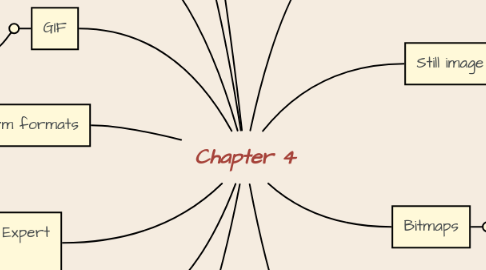
1. Macintosh formats
1.1. PICT is a versatile format developed by Apple.
2. Natural light and color models
2.1. Additive color
2.1.1. In the additive color method, a color is created by combining colored light sources in three primary colors-red, green, and blue (RGB)
2.2. Subtractive color
2.2.1. In the substrate color method , color is created by combining colored media such as painted or ink.
2.3. Dithering
2.3.1. Usually, digitized images are 24 bit, 16 million color depth.
3. JPEG(Joint photographic Expert Group)
3.1. Commonly used standard method of compression for photographic images
4. Cross-platform formats
4.1. JPEG, GIF, and PNG- Most commonly used format on the Web
5. GIF
5.1. 8-bit per pixel, bitmap image format commonly used by the world wide web
6. PNG
6.1. Support more than 16.7 million colors.
6.2. Use lossless compression technique
7. Image file compression
7.1. Lossless compression
7.1.1. Every single bit of data that was originally in the file is uncompressed. All of the information is completely restored
7.2. Lossy compression
7.2.1. Reduces a file by permanently eliminating certain information, especially redundant information.
8. Vector graphics
8.1. Advantages
8.1.1. Vector images use less memory space
8.2. Disadvantages
8.2.1. Object/drawing cannot have texture
8.2.2. Cannot be used for photorealistic images
9. Windows formats
9.1. The most commonly used image file format on Window is DIB, also known as BMP
10. Still image
10.1. Bitmaps(raster)
10.1.1. Bitmap is a simple matrix of the tiny dots that form an image and are displayed on a screen or printed
11. Bitmaps
11.1. Advantages
11.1.1. Can have different textures on the drawing ; detailed and comprehensive
11.2. Disadvantages
11.2.1. Large file size
11.2.2. Not easy to make modification to objects/drawings
11.2.3. Resizing a bit mapped image requires either duplicating pixels
11.2.4. Graphics become "blocky" when the size is increased.
12. Vector drawing
12.1. Vector-drawn graphics
12.1.1. Applications of vector-drawn object
12.1.2. How vector-drawn images work
12.1.3. Vector-drawn image versus bitmaps
12.2. Vector-drawn images are used in the following areas
12.2.1. Computer-aided design (CAD) programs needed by architects and engineers
12.2.2. graphic artist designing for the print media

